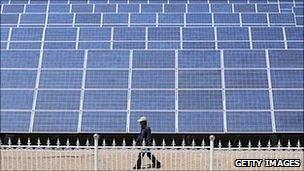China's super-rich: Zhu Gongshan
- Published
There is little information in the public domain about energy company boss Zhu Gongshan - and one gets the impression he prefers it that way.
While other billionaires invited me to their offices or even their homes, Zhu preferred to talk in a hotel suite hired solely for the occasion.
Zhu, 53, is one of the Party Traditionalists, and is not secretive so much as modest - a trait much prized among a certain type of successful businessman in China today.
His company GCL-Poly is now China's largest producer of polysilicon, the main material in solar panels, yet despite his $2 billion (£1.24 billion) fortune Zhu seemed uninterested in the luxury brands which motivate so many of the newly-successful Chinese.
The watch he was wearing was a humble Citizen.
There is a fear that by appearing overconfident of oneself and one's position in life, one might subliminally be challenging the authority of the Party.
I have no idea whether Zhu is prey to such fears, but he spoke to me using the phrases and cadences of a senior Party official, so when he talked, for example, of his wealth being "for society" - to some extent he seemed to be following the party line.
'Trusted position'
While Zong Qinghou relied on his high-level party membership to build his distribution network, Zhu benefits from his trusted position in being able to finance his operations from government-owned banks. This is how he built his solar panel company division, to the dismay of international competitors.
When the price of polycrystalline silicon shot up in 2008, Zhu was encouraged to build a factory to make it, and the China Investment Corp, or CIC, China's sovereign-wealth fund, invested $710m (£441m) in his venture.
Such financial practices are subject of regular US complaints at summit meetings. But China now makes about a quarter of the world's polysilicon and controls roughly half of the global market for finished solar-power equipment.
"Of course they are envious," Zhu replies when I asked him about Western companies' attitudes to his success. "I have done in few years what took them (much longer)."
In December 2010 GCL and CIC announced they were terminating a joint venture agreement on solar farm projects, but GCL stated that the move has no influence on its close partnership with CIC.
Energy generator
Zhu revealed that his company is involved in every sort of electricity generation. The only technology he did not mention was nuclear power.

GCL is an example of how the green agenda has been prioritised in China
He built his first electricity plant in 1996 in Jiangsu Province - and then one a year for the next 10 years all over China.
Zhu graduated from the Nanjing Electrical Professional School, majoring in electrical automation, then obtained a PhD in Business Administration from the Bulacan State University of the Philippines.
He is vice principal of the Chinese Society for Electrical Engineering and he is also a member of the 2,237-strong Chinese People's Political Consultative Conference.
This has more of an advisory function than a legislative one, although his is by no means merely an honorary position. For a businessman like Zhu it is probably also an essential networking tool.